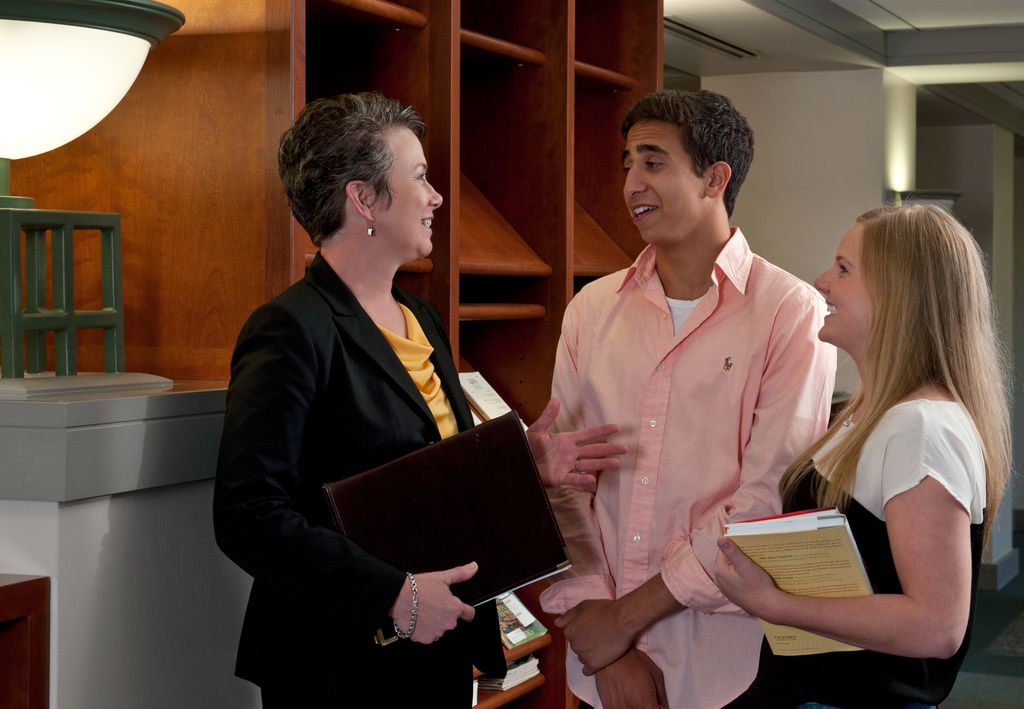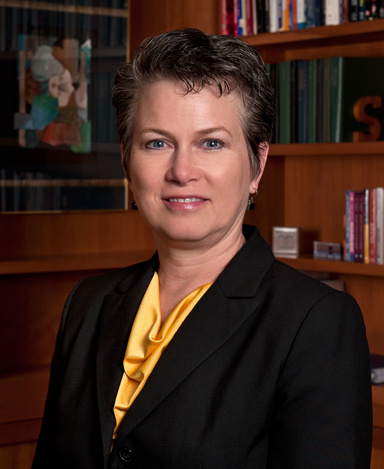
On June 30, when Sarah Fisher Gardial began her tenure as the Tippie College of Business’ new dean, the faculty, staff, and students had to show restraint and curb their excitement. Why? On her first day as dean, Gardial had hit the ground flying, traveling to Hong Kong to congratulate the graduates of the college’s International Executive MBA-Hong Kong program. But back home in the Pappajohn Business Building, staff and faculty members were making arrangements for her first weeks—and months—on campus.
What awaited her were scheduled meetings with faculty, staff, and directors of various units at Tippie; morning coffees with business leaders in the Iowa City-Cedar Rapids corridor; and meet-the-dean alumni receptions in Iowa, New York City, and Minneapolis, and introductions to 10 other University of Iowa deans and many administrators.

Gardial’s calendar is a tangible indication of how busy her first months have been.
“It’s a mosaic of colors,” she says, “and those colors mean meetings, phone calls, and other appointments fill my day. When I see yellow on my calendar, I know I have a block of time on hold so I have five minutes to think. Even when there’s no yellow, I’m having a ball,” she says.
“Choosing to work at a public institution of higher education is a high calling for me,” Gardial says. “There is no question in my mind that education is absolutely vital to the country and the world. I have a true passion for what I do and I’m energized by that every day.”
Despite the number of meetings and requests of her, Dean Gardial says she’s saying “yes” as much as she can.Tippie Magazine got a “yes,” too, when we asked her to sit down for a one-on-one interview.
Once settled on campus, what were your first weeks like?
I affectionately call that time my “walking around tour,” meeting with Tippie faculty and staff members in their offices, just trying to assess where the college stands and what we have to work with as we move forward. What I learned made me more and more enthusiastic about the opportunities for Tippie. The college is definitely moving forward from a position of strength. We are in excellent shape as a college.
As you’ve examined the state of the college today, what specifically do you see as the college’s assets?
Our biggest asset by far is the people—faculty, staff, students, alumni, business partners. People care deeply about this college, support this college with time and talent and treasure, and they want to see us succeed. I will take that any day under any circumstances. When I’m away from the college, I’m meeting wonderful people who are dedicated to this college, who have a great love for Tippie, for Iowa City, for their time here, and for this institution. Good will exists across that base and our ability to tap into that is enormous. In Jim Collins’s book Good to Great, he said you have to have the right people on the bus. We have them.
Second, we have a reputation and the infrastructure to move from strength. I’ve explored Tippie’s different degree programs, centers, and institutes, and they are enormous points of pride for us. What we need to do is take those strengths, coordinate them, and get us all moving in the same direction. What a great place to start from!
Finally, I would underscore the Tippie values of integrity, innovation, and impact. In conversations with students, businesspeople, and alumni, I keep hearing how our students and alumni are living those values both here in the college and as valued employees. This college is still spot-on in terms of what we say we are about and how we want to move ahead across those values.
A native of Hot Springs, Ark., Sarah Fisher Gardial earned a B.S. in Business Administration (marketing) from the University of Arkansas in 1980, an MBA in marketing from the University of Arkansas in 1981, and a Ph.D. in marketing from the University of Houston in 1986. Much of her academic career was at the University of Tennessee’s College of Business Administration:
1986-92—Assistant Professor of Marketing 1992-2004—Associate Professor
1999-2003—Assistant Dean, Full-time MBA Program
2003-04—Interim Associate Dean for Academic Programs
2004-08—Associate Dean for Academic Programs
2008-12—Vice Provost for Faculty Affairs
2012—Dean,Tippie College of Business, University of Iowa
The business community is running as fast as it can to be competitive and relevant. This is not business as usual. What it takes for students to be successful in the world is changing all the time. We have to stay in very close dialogue with industry to make sure we are on track with where they’re headed—or even ahead of them, if we can.During your coffees with area businesspeople, what did you learn from them?
Our business partners see a role for this college in continuing education. Right now we do MBA programming beyond the undergraduate degree, but they would like for us to think about other types of nondegree opportunities, such as single topic sessions or workshops on weekends, because they are struggling with how to keep their workforces trained in the way they need to be.
They also would love to have more discussion with us about how they can adapt their environments for a new generation of workers that are coming into the workforce, as well as how to create better interaction between multiple generations in the workforce. Because people aren’t retiring at the rate they used to, companies often have three generations within their workforce.
Our business partners just want to have more connectivity to the College of Business. They want to think of ways where we can have more interaction between our faculty and the community. They want us to be visible. In our relationship with the corporate community as well as others, we have our light under a bushel. We have wonderful things going on here that we haven’t spent the time to communicate. Businesspeople are hungry for that. While I have personally enjoyed these discussions, I think they are also very happy to be able to discuss these issues with the business college.
You mention changes within the students who are studying business today. What challenges does that create for the Tippie College?
We do see many changes in Tippie’s student population. They come in with different skills and expectations. They live in the Internet world, an international world, and they come to us with technological abilities and skills that are far ahead of the students we would have seen 10 years ago, certainly 20 years ago. At the same time, they also come with changing expectations: they want the college to use technology aggressively, to allow them to learn in a more dynamic learning environment than we traditionally have had in our education. So we’re trying to figure out how to be effective with a different generation of students who don’t want to only learn by sitting in a class lecture situation.
“Creating a global mindset” is also something that B-schools want to develop with this new generation of students. Having Internet access to the world is significantly different than actually working with individuals across cultural boundaries, a very common practice in global organizations. This is where we have an advantage at Tippie. Currently, 22% of our undergraduate students are from non-U.S. countries, with the largest percentages coming from China, Malaysia, and India. Clearly, our international students benefit from an educational and cultural emersion experience in a foreign country. However, the benefit can and should flow back to our U.S. students as well. U.S. students can learn from the international students in their classes and co-curricular activities and gain experience with the power and the challenges of culturally diverse workgroups—right here at Tippie. At the same time, students from India can experience working with Chinese students and vice versa. This is a skill that is highly valued by our recruiters.
I have had conversations regarding B-school challenges at the national level, and no one has the answers, yet. It is an incredible challenge. Business schools are all going after a moving target as we look at business education—where it is, where it’s going, and how to make sure our students are positioned for a dynamically changing environment. It’s time to think boldly about what the Tippie College will be 10 years from now.
Is it possible to dream boldly when higher education—nationally and in the state of Iowa—has seen its share of resources dwindling?
The college, the university, and higher education in general have been operating under very lean circumstances, and I know it’s no small thing to manage the budget wisely when our plans and hopes for the future far exceed the resources we have currently. My hat’s off to the previous administration, which left this college in very good shape financially. But this is not the time to be timid, and it’s time to think beyond our constraints.
Starting in 1982, which was the high water mark for funding in state higher education, on average a little over $10 per every $1,000 of revenue in state budgets was earmarked for higher education. It has been a downward slope since then. This particular campus has lost about a quarter of its state funding in the last five years. The funding challenge is a national issue for all public institutions. How long can we continue this tradeoff between state funding going down and student tuition going up? We’re reaching a point where we can’t do that anymore. So colleges and universities are trying to be more lean and efficient, trying to squeeze every dollar that we can.
Even for the best schools right now, we are in a paradigm shift of proportions that we’ve never seen or experienced. We are being challenged, but I could not be more optimistic for the college in terms of our ability to meet those challenges.
Where do you see the Tippie College headed?
There are some forces that are pushing through higher education in this country right now, and business schools in particular, that make it unavoidable for us to embrace change and innovation. As a college, we need to dream and imagine a vision for 10 years out from now that is uniquely Tippie, that we can own and embrace, and say, you know what, that couldn’t go on any place but here. Where are we going to sit in the future marketplace? Making incremental changes isn’t going to get us there. Business as usual is not going to be a model for success, and so tinkering on the margins is not the path to excellence.
At the national level, business schools have stopped emulating the highest ranked schools, and increasingly schools are saying, “We’re in a local market. We’ve got our own unique set of assets. We don’t all have to look like Wharton. We need to look like us.” I see schools experimenting in ways I’ve never seen before. Ten years ago, business curriculum changes took three years to institute. Today, it’s somewhere between a year and 18 months. I am seeing what I would call no less than an entrepreneurial spirit in colleges of business in terms of what schools are doing when they think strategically about how to move ahead in an uncertain and quickly changing environment. I think it’s the best of times to be who we are. We’ve got work ahead, but I think it’s going to be enormously fun, as well as challenging. Personally, I’m excited about it.
This article first appeared in the Winter 2012-13 issue of Tippie Magazine.